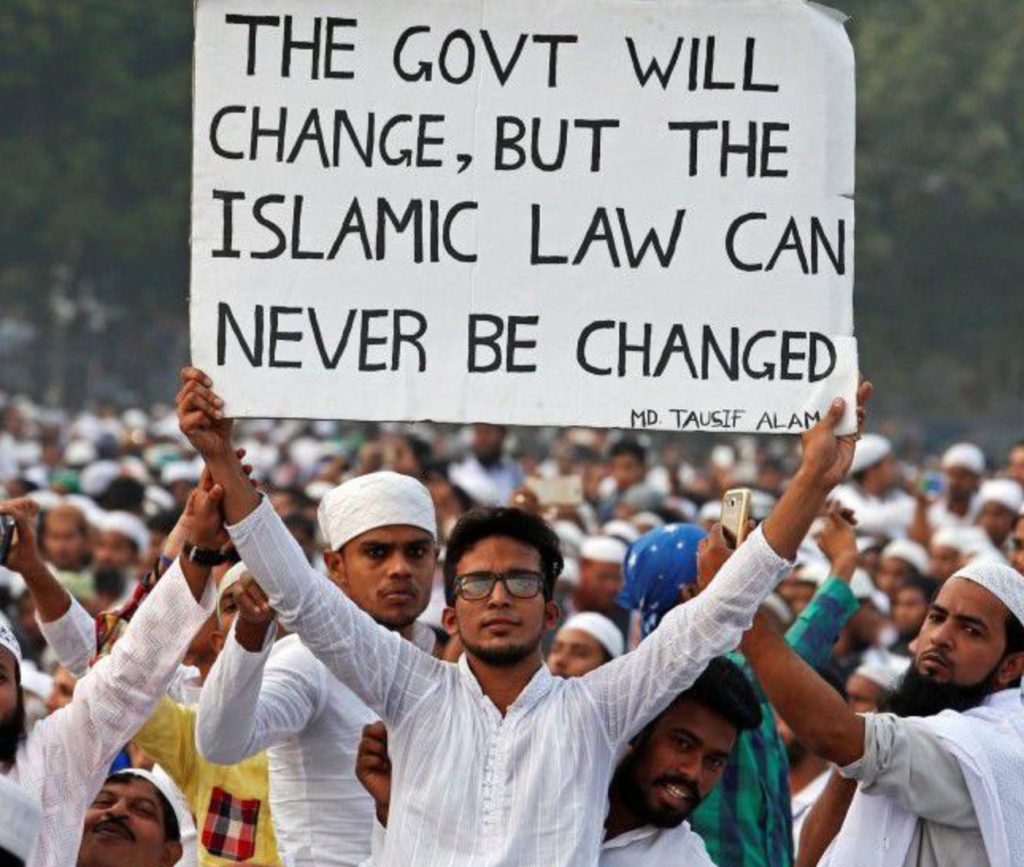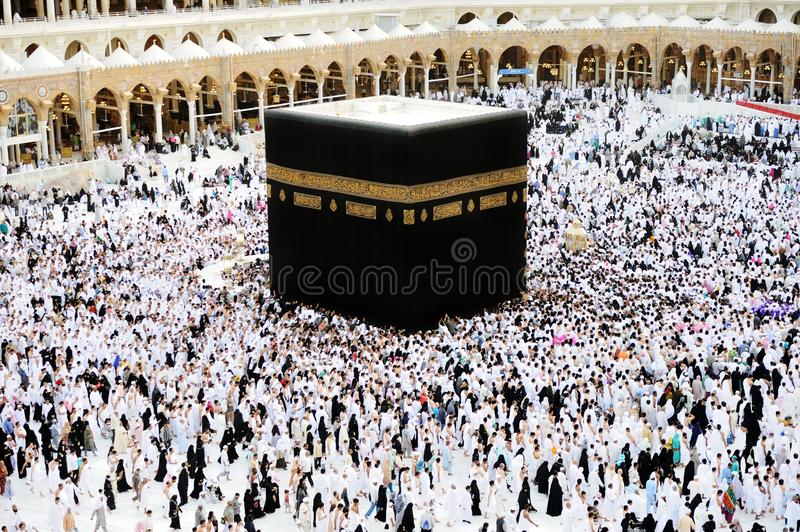
There are some who believe that the Islamic Sharīʻa is a fixed divine Sharīʻa that has not changed over the course of time or as a result of differing places and changing circumstances. For prayer is fixed and fasting is fixed ... The doctors of law produced many arguments to support this, some of them based on tradition such as the hadith and narratives such as that which runs: ‘What Muhammad has declared to be halāl remains halāl till Doomsday come, and that which he forbade is forbidden till Doomsday come.’
SIMILARLY THERE ARE what they considered to be rational arguments – that God does not change His opinion like mortals do since mankind is ignorant and makes mistakes, and is uncognizant of that which is hidden, while God is the Creator who knows all things – the patent and the hidden, their future and their fate. The conclusion that they draw is that the rule of the Sharīʻa has been fixed in the Qur’ān and the Prophet’s Sunna, and it is from this that the calls for the application of the Sharīʻa derive.
One may dispute all these rational or traditional arguments. For the Qur’ān was subject to interpretation and commentary according to the various rational, legal, Scholastic and philosophical schools, while vast numbers of the hadith are fabricated, erroneous and conflicting. The wind had these riches remained unanimously accepted, such as an argument for that, for it is the one where the Prophet says:
Lies about me have proliferated; he who intentionally lies about me let him make ready his place in Hellfire!
This was current when the Prophet was still alive – so imagine the situation after 1400 years. Suffice it to say that [the hadith collector] Muslim states at the beginning of his Sahīh that he had memorised a million hadith, while these do not record a single sentence from the Prophet’s sermons delivered over a period of ten years while he led the Muslim community in Madina. What remains in the arena is the Sharīʻa of the doctors of law, their understanding, their conflicting interpretations according to their schools of thought and their differing, conflicting inclinations.
If God’s Sharīʻa were fixed then how could His laws vary according to His various Prophets?
If God’s Sharīʻa were a fixed thing as they claim, then how could His laws vary according to His various Prophets – Ibrāhīm, Moses, David, ‘Īsā and Muhammad in the Torah, the Psalms, the Gospel and the Qur’ān? How could the verses of the very Qur’ān itself, those revealed at Madina concerning hadd penalities, retribution, inheritance, slavery, duties and rights, and the long verses that begin with the words “O ye who believe”, be altered, if the Prophet was adjudicating and conducting agreements, documents and legal rulings such as:
The adulterer and the adulteress, scourge ye each one of them (with) a hundred stripes. And let not pity for the twain withhold you from obedience to Allah [Qur’ān XXIV,2]?
For these differ essentially from the generality of Meccan verses which are generally shorter in length and which speak of the dignity of man and his equality, verses such as:
Verily we have honoured the children of Adam [Qur’ān XVII,70]
O mankind! Lo! We have created you from male and female, and have made you nations and tribes that ye may know one another. Lo! the noblest of you, in the sight of Allah, is the best in conduct [Qur’ān XLIX, 13].
or the addresses to all mankind that begin with “O ye people”. Indeed, how is it that verses and rulings of the Qur’ān itself can be cancelled out by what came after in time? Such as those concerning the qibla which pointed towards Jerusalem during the first period of the Islamic message, but was subsequently redirected towards the Kaʽba and for which verses were revealed such as:
We have seen the turning of thy face to heaven (for guidance, O Muhammad). And now verily We shall make thee turn (in prayer) toward a qiblah which is dear to thee [Qur’ān II, 144].
In Madina a mosque still remains – one of those which came to be known as the seven mosques that formed the destination of pilgrims performing the ‘umra – and is called “The Mosque of Two Qiblas”. Here the Prophet at first prayed in the direction of Jerusalem and later changed to facing the Kaʽba. There are stories that tell how Gabriel came and diverted him towards the Kaʽba, thereby turning an obligation into something prohibited, in that henceforth facing Jerusalem during the prayer was forbidden so that it became voided.
Other verses and rulings from the Qur’ān have been revoked, verses such as:
O ye who believe! When ye hold conference with the messenger, offer an alms before your conference [Qur’ān LVIII,12]
which instituted the obligation for alms whenever anyone addressed the Prophet. However this cause then anxiety and presented them with difficulties so that it was revoked with the words:
Fear ye to offer alms before your conference? Then, when ye do it not and Allah hath forgiven you, establish worship and pay the poor-due and obey Allah and His messenger. And Allah is Aware of what ye do [Qur’ān LVIII,13].
The Qur’ān also relates to us the change of the divine assignment in the story of Ibrāhīm’s sacrificing of his son:
And when (his son) was old enough to walk with him, (Abraham) said: O my dear son, I have seen in a dream that I must sacrifice thee. So look, what thinkest thou? He said: O my father! Do that which thou art commanded. Allah willing, thou shalt find me of the steadfast. Then, when they had both surrendered (to Allah), and he had flung him down upon his face, We called unto him: O Abraham! Thou hast already fulfilled the vision. Lo! thus do We reward the good. [Qur’ān XXXVII, 102-5].
where the commission to kill his innocent, sinless son appears exchanged to one of sacrificing a goat in his stead – which goes to explain the sacrifice in the story of the hajj whereby each pilgrim is enjoined to imitate Ibrāhīm’s story.
The principle of abrogation is present in the Qur’ān itself which states:
Such of our revelation as We abrogate or cause to be forgotten, but we bring (in place) one better or the like thereof [Qur’ān II,106]
And in a nearby verse:
And when We put a revelation in place of (another) revelation, – and Allah knoweth best what He revealeth [Qur’ān XVI,101]
Allah effaceth what He will, and establisheth (what He will), and with Him is the mother Book [Qur’ān XIII,39].
They have hummed and ha-ed in their attempts to explain and interpret these verses, but the basic principle is the explicit revoking of Qur’ānic verses, a process which formed a subject of study all of its own in Qur’ānic scholarship. Differences then arose as to what it was that could abrogate Qur’ānic verses – whether it was to be exclusively other verses such as the aforementioned examples, or whether hadith could also perform this task, as indicated by the revoking of temporary mutʽa marriage contained in the verse:
So with those of whom you have enjoyed sexual relations, give them their Mahr [bridal – money given by the husband to his wife at the time of marriage] as prescribed [Qur’ān IV,24].[1]
by the hadith of the Prophet following the battle of Khaybar, or the abrogation by Abu Bakr or by ‘Umar ibn al-Khattāb who declared:
Two forms of mutʽa marriage existed in the time of the Prophet of God and the time of the first caliph – but I now forbid them both and shall punish those who engage in them.
It remains prohibited among the Sunnis and permitted among the Shi’a in many of their narratives, or, as I believe, abrogated by something else (something which would require an extended study).
Abrogation will continue for as long human life and the integrity of the human mind persists
This is very close to the doctrine of badā’[2] among the Twelver Shīʽa and the divinely instituted imamate, in that the Imam is to be the eldest child, whereas after Jaʽfar al-Sādiq his son Mūsā al-Kāzim of the Twelver Shīʽa Imamate was not the eldest son. For this reason the Shīʽa after al-Sādiq divided into separate groups: the Fathiyya (the followers of Jaʽfar al-Sādiq’s son ‘Abd Allāh al-Aftah), the Ismaʽīlīs (the followers of Jaʽfar al-Sādiq’s son Ismaʽīl – an important, major sect globally) and the Twelvers (who follow the youngest son Mūsā al-Kāzim). The latter do so based on the doctrine of badā’, and they have stories of their imams such as the following words of al-Sādiq:
God has never changed His mind as He did concerning my son Ismaʽīl;
None have worshipped God in the same manner in which He has been worshipped by those who believe in badā’
with all the differences that there are between rulings on abolition or of origination under badā’. These made no distinction between legal matters on rulings of worship such as prayer and fasting – which in their nature go back to the authority of the Prophet rather than that of reason – and between social, political and administrative affairs, issues subject to human experience and varying circumstances and conditions.
Suggested Reading
I think that abrogation will continue for as long human life and the integrity of the human mind persists. For instance, the possession of slaves is considered lawful in the Qur’ān and the Sīra of the Prophet. Slavery was legislated for in manifold ways, including the capture of non-Muslims at times of war, the purchase of maidservants at slave markets and the acceptance of the gift of non-Muslim women and slavery is accepted by the Mahdi himself.
As for the Shīʽa and their belief in the infallibility of the Imams, these too had slaves, even al-Hasan al-ʽAskarī[3] who married a slave girl. It is said that the mother of the awaited Mahdi is a slave girl either from the Byzantines or from the Persians – that is that slavery for them is an accepted thing which has not been religiously revoked. Modern citizenship and the civilised human intellect refuse the exploitation of mankind whatever his colour, race or creed, through his enslavement, and this reality requires the repudiation of slavery and the enslavement of man. For he who accepts that he could be a slave to another is in possession of nothing.
[1] The full verse runs as follows: Also (forbidden are) women already married, except those (slaves) whom your right hands possess. Thus has Allâh ordained for you. All others are lawful, provided you seek (them in marriage) with Mahr from your property, desiring chastity, not committing illegal sexual intercourse, so with those of whom you have enjoyed sexual relations, give them their Mahr as prescribed; but if after a Mahr is prescribed, you agree mutually (to give more), there is no sin on you. Surely, Allâh is Ever All-Knowing, All-Wise.
[2] Badā’ (‘manifestation’) is defined as the happening of an incident that God had willed to take place in a certain way, in contrast to the way in which it actually occurred as a result of God changing His mind, or altering His decision in the light of subsequent events. The controversy arises due to the indication of possible changes in God’s attributes of omniscience, will and creation. The Sunnis accept abrogation on the grounds that this applies to legal rulings alone, whereas they reject badā’ for its implications for God’s omniscience. See Cemil Hakyemez, ‘Bada and Its Role in the Debates over Shi’i Doctrine’, The American Journal of Islamic Social Sciences, XXV, 1, pp. 20-39. (Ed.)
[3] Hasan al-‘Askarī (846-874) was the 11th Imam of the Shīʽa.


